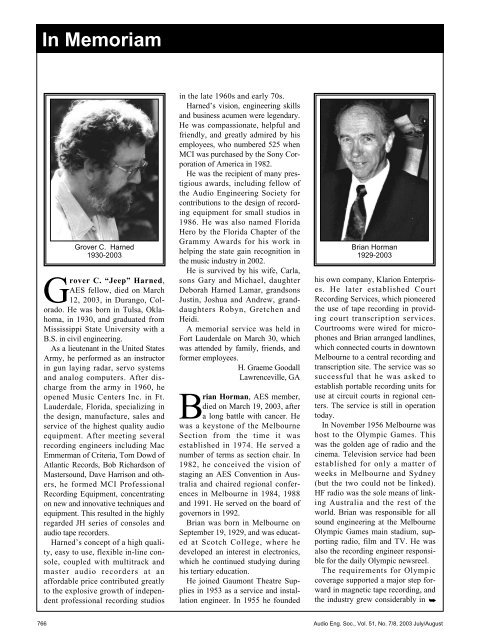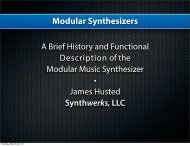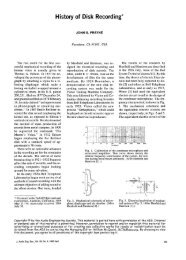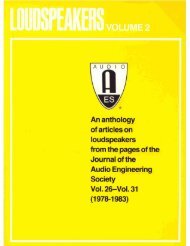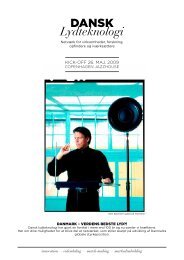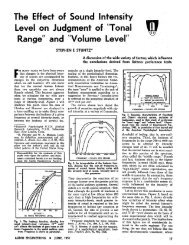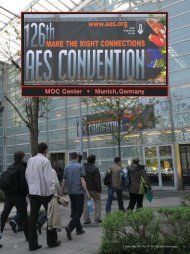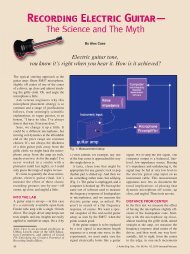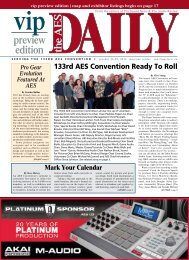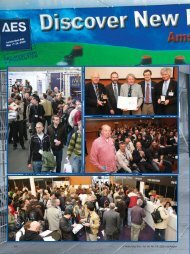In Memoriam - Audio Engineering Society
In Memoriam - Audio Engineering Society
In Memoriam - Audio Engineering Society
You also want an ePaper? Increase the reach of your titles
YUMPU automatically turns print PDFs into web optimized ePapers that Google loves.
<strong>In</strong> <strong>Memoriam</strong><br />
Grover C. Harned<br />
1930-2003<br />
Grover C. “Jeep” Harned,<br />
AES fellow, died on March<br />
12, 2003, in Durango, Colorado.<br />
He was born in Tulsa, Oklahoma,<br />
in 1930, and graduated from<br />
Mississippi State University with a<br />
B.S. in civil engineering.<br />
As a lieutenant in the United States<br />
Army, he performed as an instructor<br />
in gun laying radar, servo systems<br />
and analog computers. After discharge<br />
from the army in 1960, he<br />
opened Music Centers <strong>In</strong>c. in Ft.<br />
Lauderdale, Florida, specializing in<br />
the design, manufacture, sales and<br />
service of the highest quality audio<br />
equipment. After meeting several<br />
recording engineers including Mac<br />
Emmerman of Criteria, Tom Dowd of<br />
Atlantic Records, Bob Richardson of<br />
Mastersound, Dave Harrison and others,<br />
he formed MCI Professional<br />
Recording Equipment, concentrating<br />
on new and innovative techniques and<br />
equipment. This resulted in the highly<br />
regarded JH series of consoles and<br />
audio tape recorders.<br />
Harned’s concept of a high quality,<br />
easy to use, flexible in-line console,<br />
coupled with multitrack and<br />
master audio recorders at an<br />
affordable price contributed greatly<br />
to the explosive growth of independent<br />
professional recording studios<br />
in the late 1960s and early 70s.<br />
Harned’s vision, engineering skills<br />
and business acumen were legendary.<br />
He was compassionate, helpful and<br />
friendly, and greatly admired by his<br />
employees, who numbered 525 when<br />
MCI was purchased by the Sony Corporation<br />
of America in 1982.<br />
He was the recipient of many prestigious<br />
awards, including fellow of<br />
the <strong>Audio</strong> <strong>Engineering</strong> <strong>Society</strong> for<br />
contributions to the design of recording<br />
equipment for small studios in<br />
1986. He was also named Florida<br />
Hero by the Florida Chapter of the<br />
Grammy Awards for his work in<br />
helping the state gain recognition in<br />
the music industry in 2002.<br />
He is survived by his wife, Carla,<br />
sons Gary and Michael, daughter<br />
Deborah Harned Lamar, grandsons<br />
Justin, Joshua and Andrew, granddaughters<br />
Robyn, Gretchen and<br />
Heidi.<br />
A memorial service was held in<br />
Fort Lauderdale on March 30, which<br />
was attended by family, friends, and<br />
former employees.<br />
H. Graeme Goodall<br />
Lawrenceville, GA<br />
Brian Horman, AES member,<br />
died on March 19, 2003, after<br />
a long battle with cancer. He<br />
was a keystone of the Melbourne<br />
Section from the time it was<br />
established in 1974. He served a<br />
number of terms as section chair. <strong>In</strong><br />
1982, he conceived the vision of<br />
staging an AES Convention in Australia<br />
and chaired regional conferences<br />
in Melbourne in 1984, 1988<br />
and 1991. He served on the board of<br />
governors in 1992.<br />
Brian was born in Melbourne on<br />
September 19, 1929, and was educated<br />
at Scotch College, where he<br />
developed an interest in electronics,<br />
which he continued studying during<br />
his tertiary education.<br />
He joined Gaumont Theatre Supplies<br />
in 1953 as a service and installation<br />
engineer. <strong>In</strong> 1955 he founded<br />
Brian Horman<br />
1929-2003<br />
his own company, Klarion Enterprises.<br />
He later established Court<br />
Recording Services, which pioneered<br />
the use of tape recording in providing<br />
court transcription services.<br />
Courtrooms were wired for microphones<br />
and Brian arranged landlines,<br />
which connected courts in downtown<br />
Melbourne to a central recording and<br />
transcription site. The service was so<br />
successful that he was asked to<br />
establish portable recording units for<br />
use at circuit courts in regional centers.<br />
The service is still in operation<br />
today.<br />
<strong>In</strong> November 1956 Melbourne was<br />
host to the Olympic Games. This<br />
was the golden age of radio and the<br />
cinema. Television service had been<br />
established for only a matter of<br />
weeks in Melbourne and Sydney<br />
(but the two could not be linked).<br />
HF radio was the sole means of linking<br />
Australia and the rest of the<br />
world. Brian was responsible for all<br />
sound engineering at the Melbourne<br />
Olympic Games main stadium, supporting<br />
radio, film and TV. He was<br />
also the recording engineer responsible<br />
for the daily Olympic newsreel.<br />
The requirements for Olympic<br />
coverage supported a major step forward<br />
in magnetic tape recording, and<br />
the industry grew considerably in ➥<br />
766 <strong>Audio</strong> Eng. Soc., Vol. 51, No. 7/8, 2003 July/August
<strong>In</strong> <strong>Memoriam</strong><br />
the following years. Brian was<br />
involved in supporting that expansion,<br />
with the establishment of Klarion’s<br />
tape manufacturing plant. <strong>In</strong><br />
1965 he established the first commercial<br />
duplicating facility for 0.25-in<br />
stereo tapes in Australia (particularly<br />
for World Record Club). The service<br />
was extended in 1968 to high-speed<br />
duplication of cassette and 8-track<br />
formats. Other businesses established<br />
at the time included Galleon Press<br />
printing business.<br />
<strong>In</strong> 1969 Brian expanded the role of<br />
Klarion to become an importer and<br />
distributor of professional audio<br />
equipment, becoming the Australian<br />
distributor for manufacturers such as<br />
Otari, MCI, Soundcraft and Scheops,<br />
during a time of rapid development<br />
of the recording and broadcast industry<br />
in Australia. Klarion grew rapidly<br />
during the 70s and 80s to become a<br />
significant part of the professional<br />
audio industry.<br />
<strong>In</strong> the early 90s Brian received an<br />
irresistible offer for Klarion. He left<br />
the industry to refocus on managing<br />
Galleon Press. He subsequently<br />
established a business that developed<br />
custom software applications, and<br />
conducted classes introducing senior<br />
citizens to computer technology.<br />
Brian had a wide range of other<br />
interests, including—for a while—<br />
the sport of motor racing. He was<br />
awarded the Bob Gardiner Memorial<br />
Trophy by the Alfa Owners Club of<br />
Australia in 1983 and 1987. (It was<br />
no coincidence that a regular venue<br />
for AES meetings was also the meeting<br />
place for Melbourne’s sports car<br />
clubs.)<br />
Brian was a member of the inaugural<br />
Melbourne Section committee,<br />
and played a significant part in its<br />
development in the latter half of the<br />
70s. (See JAES, 1998, Vol. 46, No.<br />
1/2, pp.111-112). His outstanding<br />
achievement for the AES was in<br />
realizing the vision of holding an<br />
AES Convention in Australia. Recognizing<br />
a market need, the format<br />
was adapted to suit the local environ-<br />
ment. He encouraged support for the<br />
exhibits section among the other<br />
local industry members, and put the<br />
resources of Klarion Enterprises<br />
behind the daunting task of organization.<br />
This first convention was widely<br />
regarded as a great success on all<br />
levels. He subsequently chaired the<br />
following conventions in 1988 and<br />
1991. These conventions exceeded<br />
the success of the first, but required<br />
the support of a professional organizer<br />
because the administrative load<br />
was now beyond Klarion’s capacity.<br />
Much of the equipment that Brian<br />
had acquired in the course of his business<br />
over nearly 40 years was never<br />
sold but kept "in the back room." This<br />
became an important resource when,<br />
at the 1991 convention, the decision<br />
was made to establish a museum<br />
exhibit. Combined with the resources<br />
of former studio owner and colleague<br />
Bill Armstrong, Brian was able to<br />
completely document the development<br />
of magnetic tape recording<br />
equipment manufacture in Australia<br />
from the end of the war.<br />
Brian’s family was also involved in<br />
the industry. His son Andrew founded<br />
a retail venture and later worked in<br />
professional audio in Sydney, until<br />
his sudden death from an asthma<br />
attack. His daughter Fiona was diverted<br />
from her ambitions to be a<br />
ballerina to head up the duplication<br />
business, which has expanded today<br />
to become Australia’s major replicator<br />
of CDs and DVDs.<br />
Several years ago Brian was diagnosed<br />
with cancer. He was successfully<br />
treated and enjoyed a long period in<br />
remission. He set off in February this<br />
year to enjoy an ocean cruise with his<br />
wife Judith, but sadly it had to be cut<br />
short after a few days when his health<br />
suddenly deteriorated.<br />
The Melbourne Section is grateful<br />
for the many years of leadership,<br />
development and support that Brian<br />
offered during his life.<br />
John D. Smyth<br />
Melbourne, Australia<br />
J. <strong>Audio</strong> Eng. Soc., Vol. 51, No. 7/8, 2003 July/August 767


